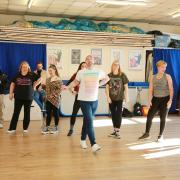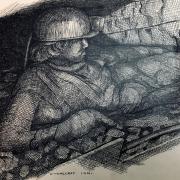What is recreational therapy for Alzheimer’s and dementia?

There are, say The Alzheimer’s Society, around 850,000 people suffering from dementia in the UK. By 2040 it is anticipated this will rise to more 1.6 million people. It is devastating for the sufferers and for their families, who over time can find themselves acting as carers for their loved one, taking on a host of practical roles, from shopping and cleaning to medicine and personal care. It is at this point, says recreational therapist Ema Keast, that families start to ask for outside help: the point point when connections to the person that was start to be lost.
“It’s inevitable,” Ema says. “Busy people can’t dedicate themselves to full-time care of an elderly parent, no matter how much they might wish to. Even those who are able to keep their parent at home have to create a fixed routine. Bringing in support from private nurses or through social care enforces an even stricter routine, and in the midst of it all, the person that the dementia sufferer used to be gets lost.
“I hear it all the time: she’s sad, or frightened, or has stopped talking... Recreational therapy is designed to tap into the sufferer’s memories of the life they once lived, to help them feel some happiness, some pleasure and peace in a life that has become horribly confusing and out of their control.”
Ema, who lives in North Wales, close to the Cheshire border, came to her current role as a private recreational therapist having been inspired by a job as an activities co-ordinator in a nursing home.

“My first day I was handed the keys to a cupboard and told to decide for myself what to do. In the cupboard were four baskets of bits and bobs that I was supposed to use with the residents. The trouble was, this was an end-of-life care home, where the ladies and gentlemen were all suffering from advanced dementia and had disappeared into themselves.
“I decided to send myself on some courses, including end-of-life care and first aid. Then I discovered the concept of recreational therapy. In short, what it means is really learning about your patient. Yes, about their physical frailties and how their dementia affects them, of course, but also who and how they used to be. I had one lady in a care home I worked with who would relax and start to talk when I just sat and sewed with her. It turned out she used to be a nanny for royalty and nobody in the care home had had any idea. Another lady would be unable to interact at all, then I would play her some music from when she was young and she could then answer questions. For both of these ladies it was a matter of removing all the other stimuli around them and replacing it with something familiar and from a time when they were in control.”
Have you considered creating a new normal for life after lockdown? If you’re not keen on going back to the way it was, you’re not alone, say The Vibrancy Hub.
Recreational therapy is gaining increasing awareness in the UK, but it’s an intensive, one-on-one therapy and so not available to most care home residents or to those living at home in the care of social services.
“Essentially, recreational therapy has to be bespoke to each individual. It takes time and a degree of intuition to work out what will be the most effective. When I am brought in to meet a new client I take a great deal of time to find out who he or she was before. What did they like to do? Visit the barber each week? Have a manicure or visit the hairdressers? What was important to him or her? What TV shows did they enjoy? What radio programmes, music, films? What is it I can do that makes them feel peaceful?”
My grandmother recently died, aged 95, after a very full life. In her last year at home, suffering from the effects of vascular dementia, we found watching Andre Rieu helped her to relax. At these times she would answer questions in an abstracted manner, but with ease, as if disengaging her mind by listening to the music allowed her to access past memories without even thinking – and thinking and fishing for lost memories at other times would cause her great upset. While the music was playing, my mum felt a connection to her mother that was otherwise lost.
“It’s about breaking though the isolation that people with dementia feel,” Ema adds. “Once we can address all the practical elements of their care, then we should be looking at their contentment and mental wellbeing. If they are caring for mum and dad at home, it’s a form of respite with the added joy that they know mum’s being treated as mum, and not as ‘the 11 o’clock’. It brings them back as a person, a little, even if only for a short while.”
Learn more about recreational therapy at emakeast.com and visit Dementia UK for support in answering questions about dementia.
Do you follow Cheshire Life on Facebook? Lots more to discover about our wonderful county!




























